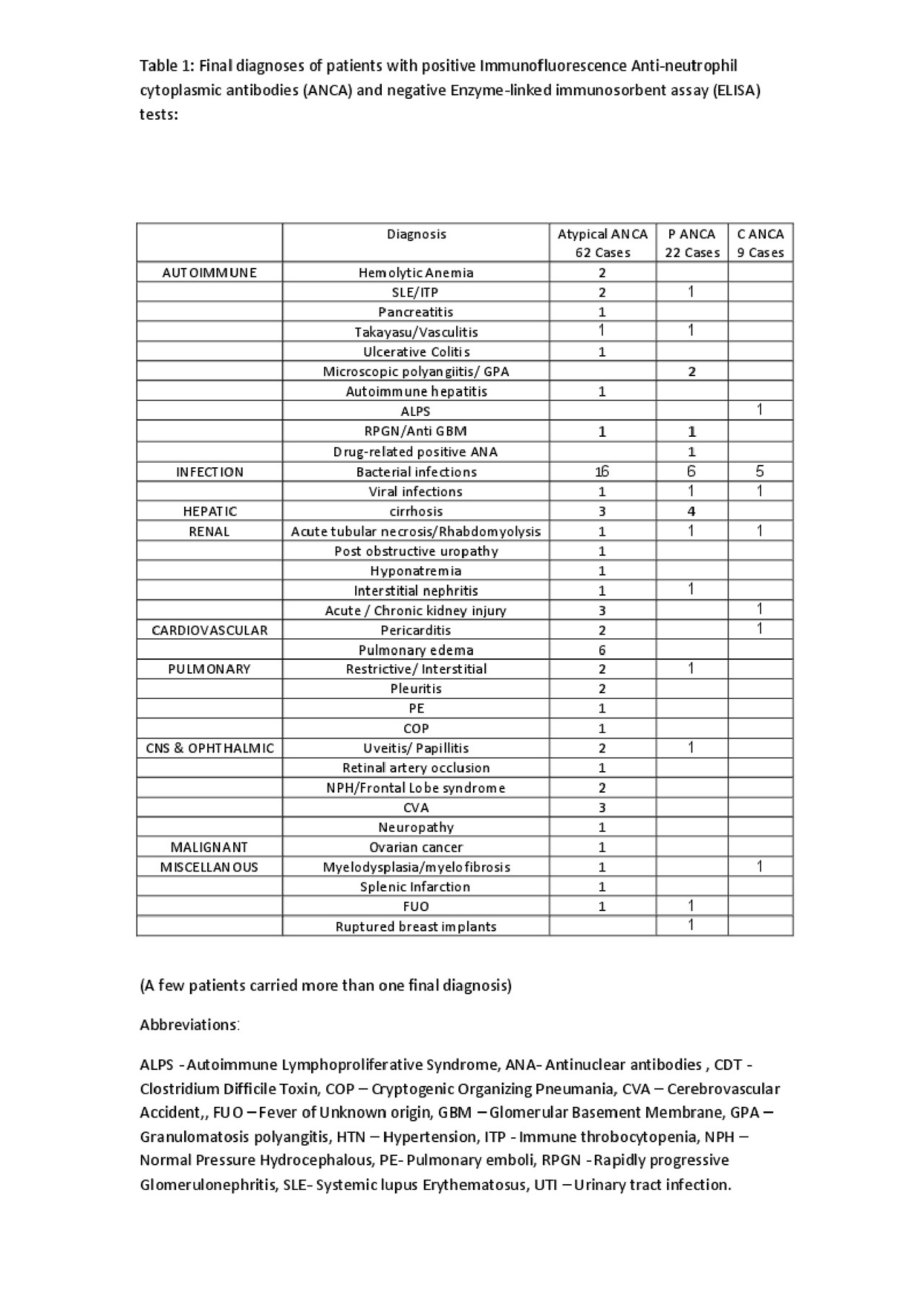Session Information
Session Type: Poster Session (Tuesday)
Session Time: 9:00AM-11:00AM
Background/Purpose: With the widespread availability of anti-neutrophil cytoplasmic antibody (ANCA) testing, interpreting positive results has become increasingly challenging. In addition to ANCA Associated Vasculitis (AAV), the spectrum of diseases associated with ANCAs has broadened to include a wide range of other inflammatory and infectious diseases including Inflammatory bowel disease, systemic lupus erythematosus, rheumatoid arthritis and drug-induced vasculitis, calling into question the diagnostic implications of ANCA positivity in a hospital setting. Immunofluorescence (IF) on ethanol-fixed neutrophils is used to detect ANCA, which can be divided into three patterns; cytoplasmic ANCA (c-ANCA), perinuclear ANCA (p-ANCA) and atypical ANCA (a-ANCA). Enzyme-linked immunosorbent assay (ELISA) is used in diagnostic laboratories to detect ANCA to specific antigens. The most common antigens used in ELISA testing are myeloperoxidase (MPO) and proteinase-3 (PR3).
Discrepancies may exist between IF and ELISA ANCA testing. We studied cases with positive ANCA IF testing but negative ELISA for both MPO and PR3, looking for their final diagnoses.
Methods: ANCA tests performed between 2000-2018 were identified using the medical center laboratory data system. Of those, all cases with negative MPO and PR3 testing were collected. Medical records of those cases were retrieved to look for their clinical features and final diagnoses.
Results: 9189 ANCA tests were ordered between the years 2000-2018 of which 549 (5.9% were positive by at least one method. 114 (1.2%) cases showed discrepancy, 93 (0.01%) were ANCA IF-positive ELISA-negative. 62 were a-ANCA positive, 22 were p-ANCA positive and 9 were c-ANCA positive. Only 2 case were diagnosed with AAV, both had p-ANCA. All other patients had a broad spectrum of diagnoses, including autoimmune, infectious, and other conditions involving the renal, hepatic, cardiovascular, and central nervous systems (Table 1, Figure 1).
Conclusion: Diagnosis of AAV is highly unlikely in cases with ANCA IF-positive ELISA-negative.
To cite this abstract in AMA style:
Breuer G, Fteiha B, Benaya A, Abu Sneineh M, Nesher G. ANCA Testing: Final Diagnoses in Cases with Positive Immunofluorescence and Negative ELISA [abstract]. Arthritis Rheumatol. 2019; 71 (suppl 10). https://acrabstracts.org/abstract/anca-testing-final-diagnoses-in-cases-with-positive-immunofluorescence-and-negative-elisa/. Accessed .« Back to 2019 ACR/ARP Annual Meeting
ACR Meeting Abstracts - https://acrabstracts.org/abstract/anca-testing-final-diagnoses-in-cases-with-positive-immunofluorescence-and-negative-elisa/


